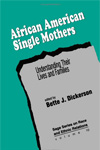|
SINGLES’ SUNDAY
Sunday, July 15, 2012
Guest Writer for This Unit: Kent L. Poindexter is a pastor, counselor, and teacher, and has served in various capacities of ministry in the greater Chicago area for more than 30 years.
The unit you are viewing, Singles’ Sunday, is a compact unit. This means that it does not have a supporting cultural resource unit and worship unit. Instead, to enliven the imagination of preachers and teachers, we have provided scriptural text(s) that we suggest for this moment on the calendar along with a sermonic outline, suggested links, books, articles, songs, and videos. For additional information on Singles’ Sunday, see the archives of the Lectionary for 2009–2011. 2011 was the first year that The African American Lectionary posted compact units for moments on its liturgical calendar.
I. Description of the Liturgical Moment
In the African American church, we are often guilty of overlooking the most available and energetic resources available for building, growing, and maintaining our church communities—our single members. Over the years, in fact, many have looked upon those who are single with some disdain, as though they were not good enough to be a part of God’s church. Those who are single, for whatever reason, and in church communities are potentially invaluable, untapped resources who can bless their congregations in unimaginable ways. Because their value has been overlooked and indirectly discounted, I have seen the numbers of single men and women (especially young adults) who actively participate in the life of local African American churches dwindle. People do not want to be where they are not wanted and appreciated.
Singles’ Sunday is an opportunity to acknowledge and to celebrate the vision, gifts, and skills of those who are not married but who acknowledge God’s calling to their respective communities to serve and to make a positive impact. It is also an opportunity to celebrate the gift of “singleness,” being free to do what God needs us to do without being torn between significant forces, those being God and the responsibility of being a partner in a family. Members should be encouraged to know that their state as a single person is not a curse, but as one of God’s people is a gift.
On this Sunday, we should acknowledge the reality that God has made each individual with a specific task in mind; no one has to be locked into stereotypes. Single members are encouraged to reflect on how they can better understand God’s will for their lives, per the biblical text. We are learning that married life is not for everyone; it requires a major lifetime commitment by all parties involved, and can put stress and strain on other relationships, even our relationship with God. So this day is one in which we can challenge all people to think seriously about their relationships with God, families, and significant others, and seek God’s guidance as to how to maintain balance in all areas of their lives.
II. Singles’ Sunday: Sermonic Outline
A. Sermonic Focus Text(s): 1 Corinthians 7:32-38
(v. 32) I want you to be free from anxieties. The unmarried man is anxious about the affairs of the Lord, how to please the Lord; (v. 33) but the married man is anxious about the affairs of the world, how to please his wife, (v. 34) and his interests are divided. And the unmarried woman and the virgin are anxious about the affairs of the Lord, so that they may be holy in body and spirit; but the married woman is anxious about the affairs of the world, how to please her husband. (v. 35) I say this for your own benefit, not to put any restraint upon you, but to promote good order and unhindered devotion to the Lord.
(v. 36) If anyone thinks that he is not behaving properly toward his fiancée, if his passions are strong, and so it has to be, let him marry as he wishes; it is no sin. Let them marry. (v. 37) But if someone stands firm in his resolve, being under no necessity but having his own desire under control, and has determined in his own mind to keep her as his fiancée, he will do well. (v. 38) So then, he who marries his fiancée does well; and he who refrains from marriage will do better.
B. Possible Titles
i. The Gift of Singleness
ii. Living the Single Christian Life
iii. Being Content . . .
C. Point of Exegetical Inquiry
In any text there can be several words or phrases that require significant exegetical inquiry. One exegetical inquiry raised by this text is the issue of how one may best fulfill his or her responsibilities to God in the Christian context. This passage is attempting to address concerns of those who are wrestling with how to live out their calling to God’s vineyard. The writer clearly is in new territory; being a ministry leader is no longer a matter of one’s birth into a particular tribe, and it is not about being a power broker, but committing one’s life to service on behalf of God. So how does one discern his or her calling in the “Christian” community?
The second question raised is how to best to live out one’s calling as it relates to one's marital status. How should those who are unmarried and the soon to be married carry out their calling to ministry? Is marriage a calling? Paul understands the challenges involved with devoting one’s life to full-time ministry, and is attempting to provoke thought about how one prioritizes his or her life in light of the call. Those who accept the call of God should do everything in their power to place what God needs them to do first in their lives. Does God prefer that people be married, or is it better to remain single, especially if one’s sense is that God is calling them to be involved in full-time service in Christian ministry? Paul calls for those who are single to carefully consider how being fully devoted to God’s service can affect their life.
Those who exegete this passage should be careful to treat it as raising more questions than it answers. Additionally, there is no one-size-fits-all answer for those who want to do full-time ministry or engage in ministry in significant ways.
III. Introduction
We live in an age in which marriage is on the decline but “partnering” is not. More people are choosing to avoid the anxieties associated with married life by establishing relationships which allow them to break the bond whenever they feel overwhelmed, afraid, bored, or simply tired of their mate. The news media tells us that more than ever, people are comfortable with the idea of having children without the benefit of marriage, or being “partners,” but not necessarily being fully committed to a partner for life. According to the Joint Center for Political and Economic Studies, by the age of thirty nearly 81 percent of white women and 77 percent of Hispanics and Asians will marry, but that only 52 percent of black women will marry by that age.
In addition, black women are also the least likely to re-marry following divorce. Only 32 percent of black women will get married again within five years of divorce; that figure is 58 percent for white women and 44 percent for Hispanic women.1 Also, many have seen the pain of parents and other family members as they struggled with unfulfilled marriages and have made the decision to avoid this kind of pain. And some people are simply happier with their single lives, having to be responsible to no one but themselves.
As one of the moral agents of society, the Christian church is faced with how to help people determine what is best for them as disciples of Jesus Christ. For the most part, the church has always encouraged marriage as the best option for all and ignored the possibility that some people may not be suited for or created for marriage. As a result, single persons in churches become “minorities” within their communities, despite the fact that they may be in the majority in terms of actual numbers. The reality of “singleness” is something which the 21st-century Christian church must grasp; and it must determine how best to affirm and embrace those who are single. How can the Church model “best practices” for a society which is always changing the rules and seems to be more content with allowing people to “be” without regard for the consequences of “being”? How can the African American church model “best practices” given the reality that many in our community will never marry or remarry?
While the African American church has traditionally been steadfast in its encouragement of marriage, it is now and for the foreseeable future faced with the reality that there are more single than married folk within its congregations and more single parents. Local churches are being confronted with issues of how to treat single parents who want to have their babies baptized and how to preach and teach to adults who are dating, having sex, and will never marry. For some, the thought of even having an unwed pastor is troubling! But these are just some of the issues which the African American church must address as it ministers to single adults if it is to truly be faithful to the commitment to serve all of God’s people.
IV. Moves/Points
There are at least two significant issues to be considered in the development of a sermon which speaks to entire congregations and encourages love and support of single persons within these communities. First, what is God saying about being single today? Paul makes it clear that his opinion is that those who are single should remain so, if they are going to be fully devoted to ministry. But what is God saying NOW? Second, how do we help the Church become comfortable with the notion that everyone is free to choose their lot in life (i.e., singleness or marriage), and will not be viewed negatively by God for their decision, and should not be judged negatively by the Church?
Move/Point One – God’s church is to be a place of comfort and rest, not one which revels in harsh rules and regulations.
a. We need to look at how we deal with those who are not married, and determine how God wants us to help them be included; and
b. We should seek to be vessels of God’s grace in our relationships in the community.
Move/Point Two – Your marital status does not determine your place in God’s community.
a. God calls us to serve faithfully, regardless of our marital status; and
b. God is concerned with whether we are faithful to the will of God and the Word of God.
Move/Point Three – God needs people of all backgrounds and experiences to do ministry all over the world.
a. Being single may be your calling; know what God is saying to you;
b. Being single is not a source of shame, but a gift to be used wisely; and
c. Be open to God’s plans for you!
V. Celebration
Today we are grateful for those in the Church who are single. Being single is not a curse; God has work for single folk to do that perhaps no one else can do. We celebrate the singles in our church because you are a part of God’s community, and you have a place of honor as a single person in God’s church. We are overjoyed that you are here; we value your presence and your input. We praise God for and rejoice with those who rejoice because they have learned how to live as single and satisfied people of God.
VI. Songs to Accompany This Sermon
A. Well-known Song(s)
- He Will Keep You in Perfect Peace. By Betty McCullough. Tune, (PERFECT PEACE).
- My Life Is Available to You. By Timothy Clifton
- I’m a Vessel. By Tony Tidwell
B. Modern Song(s) (Written between 2005–2011)
- I Owe You More. By Pamela Jean Davis
- Search Me, Lord. By Edwin Hawkins
- The Lord Laid His Hands on Me. By Charles G. Hayes
C. Spiritual(s)
- More Love to Thee. By Elizabeth Prentiss. Tune by William H. Doane
- Acceptable to You. By Eli Wilson, Jr. Arr. by Darryl Glenn Nettles
- I Surrender All. By Judson W. Van De Venter. Tune by Winfield S. Weeden
- Completely Yes. By Sandra Crouch. Arr. by Stephen Key
D. Liturgical Dance Music
- Watch Me Praise Him. By Damita Haddon, Deitrick Haddon, and Marcus Hodge
- He’s Preparing Me. By Carol Antron
E. Songs for the Period of Prayer
- Lord I Want to Know You. By Luke Mercer, Jr.
- Open the Eyes of My Heart. By Paul Baloche
F. Sermonic Selection
- Please Guide Me. By Leana Watkins and Nolan Williams. Tune, (PLEASE GUIDE ME).
- God Has Smiled on Me. By Isaiah Jones. Tune, (SMILED ON ME).
G. Benediction Song
- Don’t Let Your Light Go Out. By Kurt Carr
- The Benediction. By Evelyn Turrentine-Agee
VII. Videos, Audio, and/or Interactive Media
VIII. Books to Assist in Preparing Sermons, Bible Studies, and/or Worship Services for Singles’ Sunday
 |
Dickerson, Bette J., ed. African American Single Mothers: Understanding Their Lives and Families (SAGE Series on Race and Ethnic Relations). Thousand Oaks, CA: Sage Publications, 1995.
|
 |
Beamon, Nika. I Didn’t Work This Hard Just to Get Married: Successful Single Black Women Speak Out. Chicago, IL: Lawrence Hills Books, 2009.
|
 |
Brooks, Kim. The Little Black Survival Book for Single Saints. Detroit, MI: Driven Enterprises, LLC, 2008.
|
IX. Notes for Select Songs
A. Well-known Song(s)
- He Will Keep You in Perfect Peace. By Betty McCullough. Tune, (PERFECT PEACE).
Location:
African American Heritage Hymnal. Chicago, IL: GIA Publications, 2001. #495
- My Life Is Available to You. By Timothy Clifton
Location:
Jakes, T.D. A Wing and a Prayer. Brentwood, TN: Chordant, 2003.
- I’m a Vessel. By Tony Tidwell
Location:
Chicago Mass Choir. Saved, Sealed, and Delivered. Roswell, GA: Platinum Entertainment, 1999.
B. Modern Song(s) (Written between 2005–2011)
- I Owe You More. By Pamela Jean Davis
Location:
Campbell, Lamar. From the Heart. Franklin, TN: Alliant Music Group, 2005.
- Search Me, Lord. By Edwin Hawkins
Location:
Dillard, Ricky & New Generation. 7th Episode: Live in Toronto. Brentwood, TN:
Chordant Music Group, 2007.
- The Lord Laid His Hands on Me. By Charles G. Hayes
Location:
Hayes, Charles G. & The Warriors. The Remix. Chicago, IL: Icee Records, 2005.
C. Spiritual(s)
- More Love to Thee. By Elizabeth Prentiss. Tune by William H. Doane
Location:
African American Heritage Hymnal. #575
- Acceptable to You. By Eli Wilson, Jr. Arr. by Darryl Glenn Nettles
Location:
Zion Still Sings for Every Generation. Nashville, TN: Abingdon Press, 2007. #210
- I Surrender All. By Judson W. Van De Venter. Tune by Winfield S. Weeden
Location:
African American Heritage Hymnal. #396
- Completely Yes. By Sandra Crouch. Arr. by Stephen Key
Location:
Zion Still Sings. #180
D. Liturgical Dance Music
- Watch Me Praise Him. By Damita Haddon, Deitrick Haddon, and Marcus Hodge
Location:
Haddon, Deitrick & Voices of Unity. Together in Worship. Indianapolis, IN: Tyscot, 2007.
- He’s Preparing Me. By Carol Antron
Location:
Wilmington/Chester Mass Choir. He’s Preparing Me. Atlanta, GA: Atlanta International, 1991.
E. Song for the Period of Prayer
- Lord I Want to Know You. By Luke Mercer, Jr.
Location:
Caldwell, Kirbyjon and the Windsor Village UMC Mass Choir. Welcome to the Village.
Brentwood, TN: Chordant, 2002.
- Open the Eyes of My Heart. By Paul Baloche
Location:
Howard, Larue. How Great Is Our God. Brentwood, TN: EMI Gospel, 2008.
F. Sermonic Selection
- Please Guide Me. By Leana Watkins and Nolan Williams. Tune, (PLEASE GUIDE ME).
Location:
African American Heritage Hymnal. #613
- God Has Smiled on Me. By Isaiah Jones. Tune, (SMILED ON ME).
Location:
African American Heritage Hymnal. #152
G. Benediction Song
- Don’ Let Your Light Go Out. By Kurt Carr
Location:
Carr, Kurt & The Kurt Carr Singers. Just the Beginning. Inglewood, CA: Gospocentric, 2008.
- The Benediction. By Evelyn Turrentine-Agee
Location:
God Did It. New York, NY: Worldwide Music, 2000.
Note
1. Williams, Ashley Michelle. “Black Marriage Survives Despite the Statistics.” December 23, 2011. Online location: http://www.thegrio.com/specials/life-and-style/is-marriage-dead-for-african-americans.php accessed 2 February 2012
|